

The first thing you’ll probably want to know about Tobias Forrest is where he was raised, whether his childhood was really lousy, how he broke his neck and all that what-doesn’t-kill-you-makes-you-stronger kind of crap. There’s a lot of that. But first, some random coincidences: 1. Toby’s dad, Alan Olsen, who is in fact his uncle, had been working with the Miami Project to Cure Paralysis and knew founder Barth Green, the neurosurgeon, two years before Toby got hurt. Dr. Green later treated Toby. “What’s even spookier,” says Alan, “is that the cervical plates used to stabilize his neck came from a surgeon I knew and a company I founded.” 2. Toby’s sister, Nikki Olsen (really his cousin), once followed Toby off 60-foot cliffs. She wrote a class screenplay about a guy who got injured jumping off canyon walls into water pools. Shortly after she handed it in, Toby made his quad-ifying swan dive off a rock in the Grand Canyon. 3. To nearly the day on Memorial Day weekend, Toby and Christopher Reeve share a traumatic anniversary, three years apart; Toby credits Reeve’s audio version of Still Mefor getting him through rehab. Later Toby received a $5,000 scholarship, funded and presented by Reeve himself, to study acting in Los Angeles. 4. His middle name is Easy, to commemorate his difficult birth, and for us to speculate on the weight of tragedy and trauma on a man’s life.
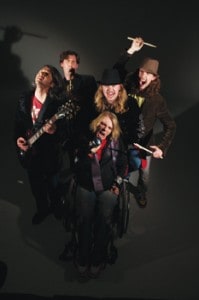
On the accomplishment side, Toby has been in equity stage productions and on the cable TV show Weeds. His best-paid gig ever was acting in a Wal-Mart commercial that ran for two years. He has done some comedy and co-hosts a weekly radio show with two very funny women, Geri Jewell and Kathy Buckley, spreading a life-is-good, disability-is-normal message. He’s a founding member of Ralph’s Riders, an L.A.-area peer support group reaching out to the newly injured. Says Mayra Fornos, whose late husband Ralph, a quad, inspired her to start the Riders, “Toby is a cool dude. He knows who he is. He’s found his essence. And he’s always willing to connect with people and share his message.” Mayra wept when Toby debuted the song “Ride On” last year at a Reeve Foundation event. “Ask for help I’ll always be there,” the lyrics go. “You’re never alone; don’t ever be scared.” Says Toby, “I wrote the song for Ralph’s Riders. Although we all had a dream and were on a path, it’s still possible to realize that dream. You might need the help of some other people, and like the song says, don’t be afraid.”
Toby never has had any issues with fear. The dive that broke his neck was only 10 feet high, but the weekend before, he says, “I was doing backflips off a 40-foot cliff at Lake Havasu. I’ve jumped off stuff that’s 80 feet before. When someone asks how I got hurt and they go, ‘Oh, I’m so sorry,’ I go, ‘Oh, no, you don’t know what I was going to do the weekend after that.'”
Toby still auditions for acting gigs now and then, and continues to study the craft, but his main thing is music. He is the singer in Cityzen, a group he founded in L.A. with guitarist Jeff Line, with whom he played in college in Arizona 12 years ago, pre-wheels. They used to live in the same apartment complex and kicked the hacky sack around. Jeff had a band, Toby started coming around. “I dug his voice,” says Jeff. Says Toby, “My first performance was horrible, I forgot all the words, didn’t know about timing or structure, I bombed horribly.” Didn’t matter. They played house parties and sometimes in bars. “We were called Mos Eisley, you know, the spaceport town from Star Wars.” Toby and Jeff later formed another band, Succotash. Their last show before they left college was at a historic Flagstaff hotel, the Monte Vista. “It was Cinco de Mayo, just a huge show. We tore the place up,” says Jeff. “Then they threw us out.” A sink broke off the wall in their hotel room and flooded the place. The elevator got broken. “We lived it up like rock stars that one night,” says Toby.
A few days after graduation Toby and some friends went for that fateful hike in the Grand Canyon, just a couple of hours away. “We were all devastated by the news of his injury,” says Jeff. “Toby was such an athletic, physical person, very agile, always the first person to try something. A risk taker, no doubt.”
Life in Hippie Hollow
When he was 6, Toby Forrest already knew how to trim marijuana buds. He’d seen it done by his father, Salty, a nautical, free-spirited fellow by all accounts. “My parents were hard-core hippies,” says Toby. “I thought drugs were part of the norm. I didn’t realize my dad was a drug dealer. That’s why the Hell’s Angels were over all the time. It was a pretty open thing. By 7 I drank beer, had smoked marijuana. That was the culture. In a lot of ways it was a beautiful, amazing way to grow up, in Hawaii, but it was such a skewed reality. My mom would sleep for 24 hours straight. That seemed normal to me. My parents were extremely immersed in the drug culture. Pot, cocaine, speed. If I went through a photo album you could see the deterioration of this beautiful young woman who had gotten ravaged by that culture.”
His mother Marla was a bit of a rebel from a military father and a strict Midwestern upbringing; she first met Salty playing sitar on the beach in India. They were married there. Their first child, Lani, was born on a houseboat in Sausalito, Calif. “We used a bucket for the bathroom,” says Lani. Two years later came Toby. “My dad — actually I prefer to call him my father because he was really more of a sperm donor than dad – was definitely a rolling stone.” They moved a lot and wound up in Maui — on the beach, under the volcano, in the rain forest. The kids got a taste of being different: Native islanders called them haoles (howlies). The last day of school before summer was Kill Haole Day. The Hawaiian kids got to pick on the white children.
When Toby was 6 or 7, Salty split. “He was on the run, always on the run,” says Toby. Adds Lani, “The FBI was in the front door, dad went out the back and ran into the sugar cane fields. Somehow he got away.”
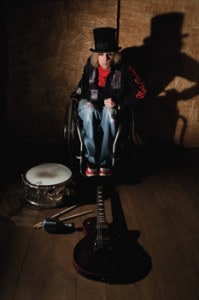
A year later Salty came back for a brief visit. That was the last time anyone in his family saw him. “My mom was now a single mother kinda trying to get her life in order, taking care of two kids. She needed help, so she went back to my grandparents in Minnesota.”
Marla started working, went back to school for art. “It seemed like everything was going in the right direction,” says Toby. “She met a guy, started dating. He was pretty well off, owned his own gas station and shop, had money, nice house, nice cars. He lived the Minnesota lifestyle, going out on ATVs, hunting. He took a shine to my mom. She dated him for a year or so. One day, she took me to his house. My sister was babysitting. We were having some car problems and he was going to fix it. I didn’t know that their relationship was on the rocks. He wanted my mom to marry him. She wanted to end it. They had been arguing. I was outside playing. I went in and told my mom I want to go, let’s leave. She said, in a little bit. I went outside and played. I was angry, so upset with my mom. I wanted to leave. When I came back inside, it was just him. Where’s my mom? She’s in the bathroom, go outside and wait in the car. I knew we were leaving our car there so I got into his car. After a while I heard a gunshot go off, and I thought, hunters, they’re after me. I hid under the dashboard from the hunters. I saw him come out of the house. He looked in the car and didn’t see me. He looked in the other car, went back inside. In about three hours a sheriff came and said, I have to tell you something. Your mom is dead.”
Marla tried to leave and was shot in the back. The defendant claimed during his trial that he was cleaning a shotgun and that the trigger got caught on his clothes and it went off by accident; the forensics left no doubt it was intentional.
“There was only one witness,” says Toby. “Me. I had to testify. He’s in the courtroom and I have to point him out. He’s got a defense attorney who’s trying to make me look like a 9-year-old kid who’s exaggerating the story.” The guy got 20 to life; he’s still serving time.
“I was strong enough to testify and send this guy to prison, but it also changed me,” says Toby. “It gave me a darker side to my personality. In my romantic child’s mind I used to think: One of these days I’m going to right this wrong. I kinda wanted to go into the Marines and become a Marine scout and become an assassin. I had a really dark mentality. I would plan, how am I going to show up in the middle of the night and cut this guy’s throat? I was angry, and I had so much guilt. I felt as a child I could have saved my mom’s life, if I had only been more adamant, more upset and told her no, we have to leave right now, maybe nothing would have happened. As an adult, I realize I have to let that go. That I could never have changed that, I had no control over that situation.
“It took me a long time to realize I have to empathize with that child. It took a long time. I was so blessed by the family I got taken in by. Until then, I didn’t know what family meant.”
New Family, New Life
Toby and Lani were adopted by Marla’s sister Darylin and her husband, Alan Olsen. They were living in Memphis, Tenn., and had two kids. Lani and Derek were just days apart in age, Nikki was two years younger than Toby. Says Alan, “The grandparents, the family, we totally encircled these kids with a lot of love and support. We assured them they would not be abandoned. We tried not to perpetuate the drama. We made it clear from the start that Toby and Lani were going to be treated exactly as our kids were.”
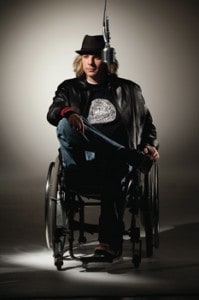
Meanwhile, Alan was a Type A workaholic and Darylin the house general. The contrast for the Forrest kids could not have been sharper. Says Darylin, “We ran a tight ship. We were conservative Midwesterners. Tobi and Lani were in a completely new world. Lani said once she just hoped to get into the Brownies. Here she was swimming on the country club team.”
Toby and Lani quickly melded into the new family. They called their aunt and uncle mom and dad and bonded well with the cousins. Says the new mom, “I wanted yes sir, no sir, I wanted to control how they dressed, how they thought. Kids don’t need a best friend. They need a parent. My job was to build a container for them, a place where they could feel safe, as safe as their previous life experience could allow.”
Toby was not inclined to go along. His family described him as a nonstop envelope pusher, smart aleck, badass. Says his dad, “Toby was a handful, always testing boundaries. Not in bad way, more mischievous.”
“I had chores and rules,” says Toby. “Never had rules before in my life, and I was good at breaking the rules. Stealing alcohol and drinking, doing drugs, stealing golf carts, driving them into the lake. At 15 my parents said we know you’re doing things, they didn’t catch me but said, you need discipline and we want to send you to military school.”
Lani said he did indeed seem to need military school, Darylin said it was Toby’s idea — but Toby says he felt like he was being sent away. “I took it as, ‘Oh, you want to get rid of me? Fine.’ I always wanted to be a Marine scout or a sniper. They sent me to Valley Forge academy, where Gen. Schwarzkopf went. You see the movie Taps, that’s the school. I took it on a personal level, you took me in and now you don’t want me. I know that’s not the case. They were thinking, ‘How do I keep these kids from going down the path their parents were on?'”
Turns out Toby took to regimentation. “Rules and structure and marching — I was good at it. Good at doing what they wanted me do, but also good at breaking every rule they had.” During his second year, Toby made first lieutenant. “In one year I went from being nothing to being the second most important guy.”
He adapted. “I am a creature of change,” says Toby. “I am a changeling. Put me in a room full of Christians, I will get along with them. Put me in a room of Satanists, I’ll probably get along with them, too. I’m going to find some way to fit in.”
Death and Rebirth
Right after graduation, Toby took off for summer school at Northern Arizona University. “I wanted to grow my hair out, become a hippie, play hacky sack and play in the woods and go skiing,” he says. He did all that and also found the music muse.
May 25, Memorial Day, 1998: “My friends and I were all going to be leaving, so I wanted one last trip to the Grand Canyon, which was like a second home to me. My girlfriend had a new camera and wanted me to dive off the waterfall. I asked her, ‘Is it safe?’ She said, ‘You dove off it last time.’ So, I was the first one, I was always the first one. If you want something crazy done, I’ll go first. Normally I’d do a backflip, but this time I did a swan dive, hit the bottom, shattered C5 and was totally conscious. I felt a shock of electricity go through my body. Then I couldn’t move.” The photograph did not survive.
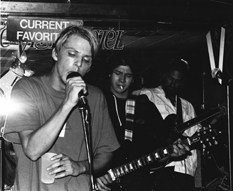
“There was no air in my lungs and I was five feet underwater. I knew my friends were thinking that I dove in, swam to the other side of the waterfall and was hiding. That’s what I would do. But they couldn’t find me. Everybody was looking for my body and couldn’t find me. I held on for as long as I could. I inhaled water and drowned. I remember thanking God. I had a good life, I was ready to go. I thought, thank you for allowing me to live. I felt love. It was the most amazing experience being bathed in blue light, I didn’t have any worries, I didn’t have a body. I didn’t feel that life had ended but that it had just begun. I was so happy and comfortable. Meanwhile my body had floated up to the edge of the water. A guy pulled me out, not knowing I had a broken neck. Picked me up like a baby. My girlfriend tried to resuscitate me, but couldn’t. A doctor who was there came over; he resuscitated me. He brought me back.”
Should he have stayed on the other side? “I am spiritual,” says Toby. “I have no doubt things were supposed to happen to me by coming back from being dead. I believe in a loving presence that we are all part of. Before, I was never afraid to die. Now I’m not afraid to live.”
Toby stayed in a Flagstaff hospital until his pneumonia was under control. Alan arranged for him to rehab at the Miami Project. The girlfriend from the canyon, who Toby was in the process of breaking up with when he got hurt, came to Florida and stayed with him for a good year. He went back to school, got a master’s in psychology, thought about a clinical practice. On a whim he took an acting class and as an assignment had to portray someone with Alzheimer’s disease. “I wrote a whole monologue about a man who thinks he’s at the train station, going away with his wife. I did the monologue as an old man. People came up to me and said, ‘Dude, how come you’re not an actor?'”
Toby looked into the acting game. He phoned Danny Murphy, a friend and mentor from Florida who had moved to L.A. to act from his wheelchair. “Danny said, ‘Go to this place, take a class.’ I did. That’s how I got into acting.” When Toby moved to L.A., Danny hooked him up with the Media Access Office, and they suggested the tryout for the Reeve scholarship. Toby used his Alzheimer’s script. “Not bad: $5,000 for three minutes work.”
Toby got some work in a large cabaret show for a while, did some comedy and then, working as an usher at the Kirk Douglas theater, got noticed and was asked to audition for a serious equity project. “The director said, ‘I like you but you don’t have a lot of acting experience.’ I said, ‘I know, but I have a lot of wheelchair experience.'” The play, Pyretown, by the late John Belluso, was about a world-wise wheelchair user who sold drugs on the side and helps a woman understand how to work the system. It ran in Pittsburgh for three months and had a brief run in L.A.
This small bit of success on stage revealed something: “There is a fine line between fate and chance: It’s called choice. My injury was an accident. It’s up to me to take the accident and turn it into something. What I realized by being in the play is that while I wanted to help people, psychology can only affect a roomful. As an entertainer, I can affect a world full of people.”
Of course the roles do not pour in for the disabled actor. Toby sees widespread fear and reluctance. “As an actor with a disability, there’s far more prejudice. Twenty percent of the population has a disability but one half of one percent of words spoken on TV are from a disabled person. The part — a wheelchair part — goes to a guy who has no disability.
“As a musician, they couldn’t care less about the wheelchair. They just want to know if I can bring 30-plus people to their venue.”
The Making of the Man
And so along comes the reunion with Jeff and the formation of Cityzen. “I thought music was done. I could barely cough, how am I going to sing on stage? But after I met up with Jeff again, years after we hadn’t even talked, we started playing music every Friday at my house. I realized music was my whole life, the path I wanted.”
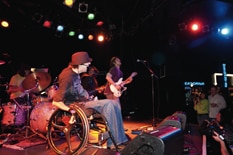
The guys in the band are just scraping by — they all have day jobs. What has to happen? Who knows, but Toby knows the game: “You have to be in the right place, right time with the right attitude. And be prepared. My acting teacher says success is when opportunity meets preparation.”
Toby seems to be adapting, again:
“It must be in the way Toby is wired,” says his dad. “I’ve seen kids and families come totally unglued by this. Toby never played the victim and we didn’t let him — we didn’t allow pity parties.”
Says sister Nikki: “Toby never got into a long period of self-pity. That made it easy to be with him — even with helping with care and disability issues, it was fun. Bad things have happened to the family, but we have always been able to rally and make a positive out of it. You figure out how to be happy.”
Says his mom: “He didn’t go to the dark side after his accident because a spark within him wanted life, and the only way for him to truly live is through his humor, quick-witted intelligence, and good-natured cynicism. Toby is a happy man, and that allows us to feel better about ourselves when we are in his presence.”
Says brother Derek: “He’s been shaped by his spinal cord injury. In some ways, it’s made him more accountable, more sensitive. As a result of his struggles, he will be a star.”
Says sister Lani: “Music makes him happy, you can tell.”
Says Toby, “I can’t not do what I’m doing. Would die on the inside if I didn’t. My goal is not to become famous-Toby-in-wheelchair, but to become an artist who can survive off art. Like Robert David Hall or Chris Voelker. Or Tommy Hollenstein. Turn art into something that pays the bills.
“I’m hungry to do more. I love entertainment, I’m not here to show the world people with disabilities, I’m here to show people with disabilities the world. It doesn’t matter what you look like or what you can and cannot move. If you are creative, you have the right to share what you create.”
Cityzen: The Band
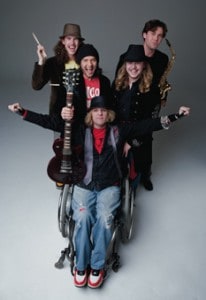
Besides Toby Forrest and guitar player Jeff Line, Chris Woods does keyboards and his brother Nick is on drums. Nick Lopez plays bass and Joe Spangler adds violin and sax. The band is serious enough that they rented Jack Johnson’s studio to record a CD, engineered by Robert Carranza, a guy who has won four Grammys. You can buy “Invisible Mental Tentacles” on iTunes — “I want to reach into heads of listeners, grab them with invisible tentacles,” says Toby, “get into their mind and make them think.” Call them progressive urban-savvy funk-metal. Toby has always liked the band Tool, once described as “the thinking person’s metal band.” The band members all dig Mars Volta, certainly more cerebral than ’90s contemporaries Megadeath or Pantera.
Cityzen’s “Lizard People” is ostensibly about people (like the infamous Balloon Boy’s dad) who believe Hillary Clinton is part of a lizard conspiracy to take over the world (I’m not making this up). “The whole point is to show that it’s people who are poisonous,” says Toby. “Smooth Dirt” is about the once all-powerful force of religion, now a sick dog that has to be put down. Toby says people have compared Cityzen to a harder Pink Floyd. “Fatal Lullaby” is about old Mother Earth. “If we don’t pay attention, not take care, we’ll all be gone and the earth still [be] here,” says the lyricist.
Cityzen performs live to a small but growing fan base. Working but not exactly opening for the Red Hot Chili Peppers, if you know what I mean. Gigging around L.A. these days means that a band brings its own paying fans. Clubs and bars here rarely pay a no-name band outright — off-quota musicians sometimes end up owing the club money, a bargain the almost-famous accept for a chance to be in the right place at the right time. Once or twice a week Cityzen lifts Toby up on some of the very same stages that launched the Eagles, the Doors, Guns ‘N Roses, the Wallflowers, System of a Down, and many more. They run through a 30-minute set, including most the tunes on the CD and one that’s not, the picked-to-pop house-rocker, “Drunk Hollywood White Girls.”
“DHWG” is about unrestrained young women confronting the cute guy in the wheelchair. “Before, it was easy, or at least easier with women,” says Toby. “In the wheelchair, no matter how charming or good-looking you are, there’s always a barrier. But drunk girls, they love me. Part of it is that I’m a place to sit, an open invitation for them to sit on me. Then they want to push my chair around and run over people’s toes.” So he wrote the lyrics and worked up the song with Jeff. “It’s definitely a fan favorite. We see it as a novelty song, more of a live song, and didn’t include it on the CD. Funny thing is how many girls will come up after and say, ‘Oh, that song was about me.’ Well, girl, it’s not a compliment, you know?”
Support New MobilityWait! Before you wander off to other parts of the internet, please consider supporting New Mobility. For more than three decades, New Mobility has published groundbreaking content for active wheelchair users. We share practical advice from wheelchair users across the country, review life-changing technology and demand equity in healthcare, travel and all facets of life. But none of this is cheap, easy or profitable. Your support helps us give wheelchair users the resources to build a fulfilling life. |


Recent Comments
Bill on LapStacker Relaunches Wheelchair Carrying System
Phillip Gossett on Functional Fitness: How To Make Your Transfers Easier
Kevin Hoy on TiLite Releases Its First Carbon Fiber Wheelchair